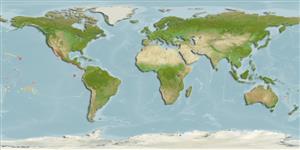Environment: milieu / climate zone / depth range / distribution range
Ekologi
marina bottenlevande; djupintervall 0 - 45 m (Ref. 11482). Tropical
Eastern Pacific Ocean: from the Gulf of California and southwestern tip of Baja California northward to Bahia Santa Maria. Former subspecies D. pectoralis fallax (Mexico to Ecuador, including Cocos Island) and D. pectoralis insulatus (Revillagigedo Islands) in Ref. 11482 were elevated to species level.
Size / Vikt / Age
Maturity: Lm ? range ? - ? cm
Max length : 5.2 cm TL hane/ej könsbestämd; (Ref. 11482)
Distinguished from D. fallax and D. insulatus by having the following characters: scales absent above the lateral line; upper lip fimbriae, modally 9; preopercular canal pores, modally 5; unbranched labial fimbriae (Ref. 82814).
Found on sandy bottoms near reefs (Ref. 37955). Feeds on small fishes and invertebrates (Ref. 11482). Minimum depth from Ref. 58018.
Life cycle and mating behavior
Könsmognad | Reproduktion | Lek | Ägg | Fecundity | Larver
Allen, G.R. and D.R. Robertson, 1994. Fishes of the tropical eastern Pacific. University of Hawaii Press, Honolulu. 332 p. (Ref. 11482)
IUCN Red List Status (Ref. 130435: Version 2024-1)
Threat to humans
Harmless
Human uses
Verktyg
Special reports
Download XML
Internet-källor
Estimates based on models
Preferred temperature (Ref.
123201): 20.6 - 28.4, mean 24.7 °C (based on 56 cells).
Phylogenetic diversity index (Ref.
82804): PD
50 = 0.5000 [Uniqueness, from 0.5 = low to 2.0 = high].
Bayesian length-weight: a=0.00389 (0.00180 - 0.00842), b=3.12 (2.94 - 3.30), in cm total length, based on all LWR estimates for this body shape (Ref.
93245).
Trofisk nivå (Ref.
69278): 4.0 ±0.61 se; based on food items.
Fishing Vulnerability (Ref.
59153): Low vulnerability (10 of 100).
